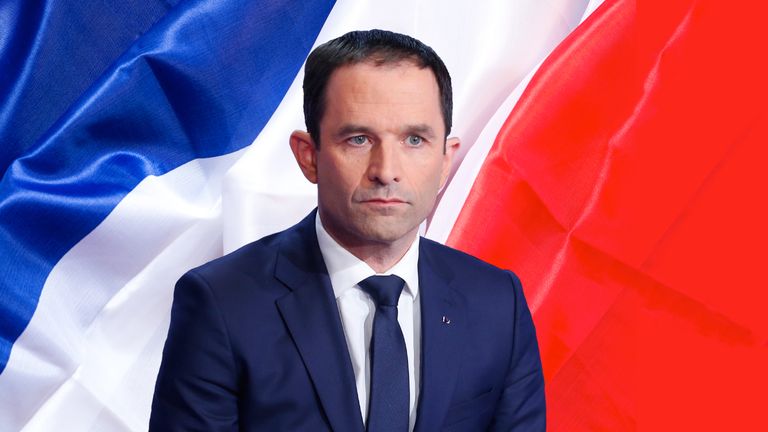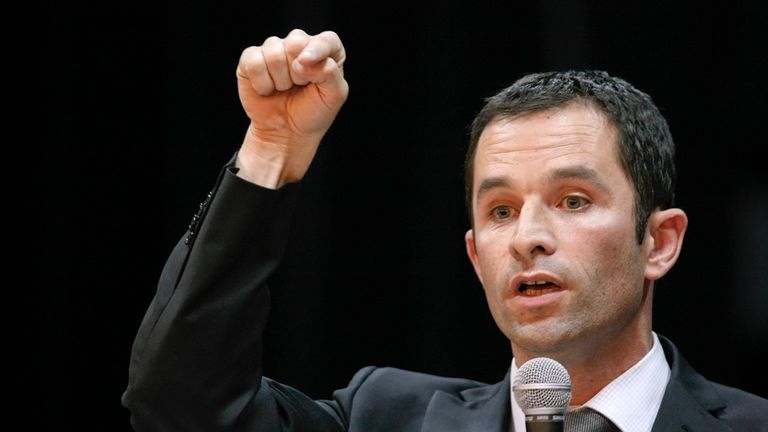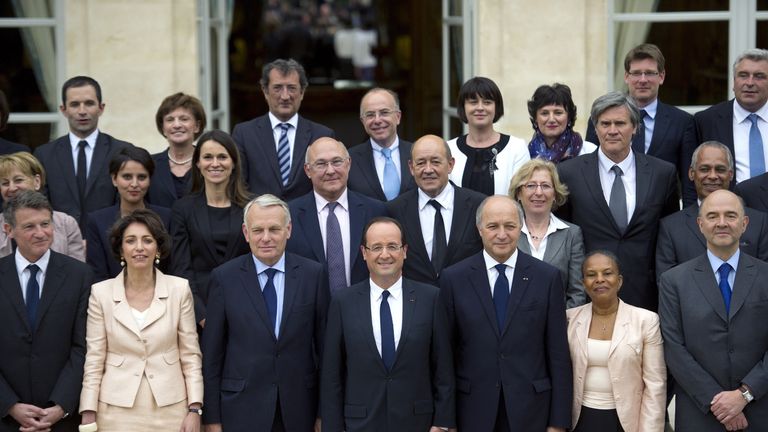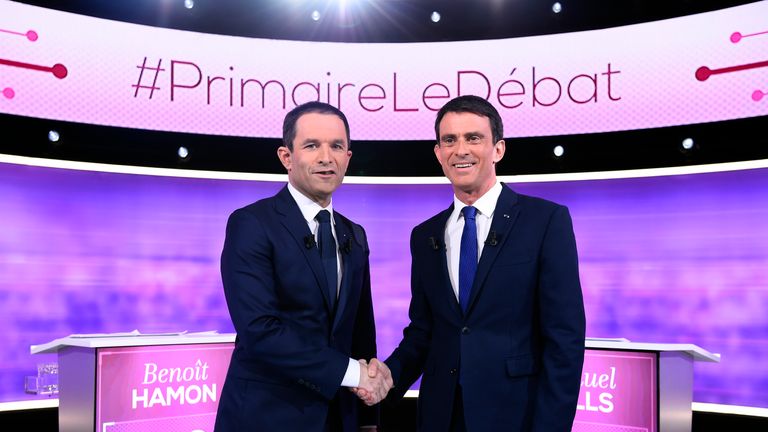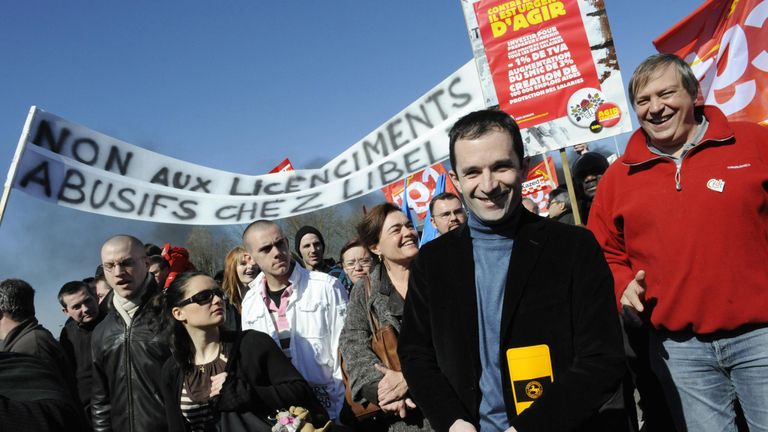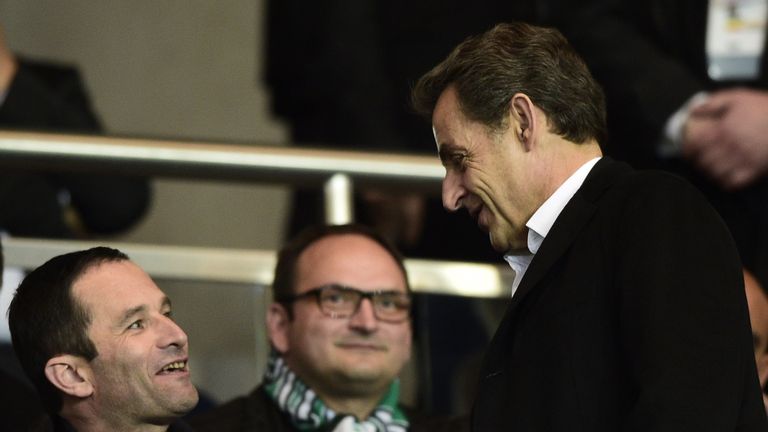French presidential election: Who is Benoit Hamon?
The hard-left Socialist has been dismissed as a dreamer, but he maintains he has a vision to "make France's heart beat".
Sunday 16 April 2017 16:02, UK
With odds as wide as 20/1, Benoit Hamon is seen as a long-shot to win the race for the Elysee Palace.
The Socialist candidate's radical manifesto caught the imagination of party members and secured his presidential nomination, but the 49-year-old faces an uphill struggle in selling his vision to the electorate.
The Socialists have become deeply unpopular since taking power in 2012, with Francois Hollande's administration flagging in the polls amid a surge in support for right-wing populist Marine Le Pen.
However, Mr Hamon has said that his unexpected nomination was proof that "the French left is holding its head high, is turning to the future and wants to win".
Read on for a look at Hamon's life and policies and learn more about his four main rivals.
Early life
Born in the medieval town of Saint-Renan in 1967, Mr Hamon showed interest in politics from an early age.
For a short time he lived in Dakar, Senegal, where his father Francois, a naval engineer, had been transferred for work.
Francois Hamon says his family "never lived in opulence" - a background which he credits with keeping his son grounded.
"Benoit knows the working world very well," he told Le Telegramme. "He knows where he comes from and has not forgotten it."
After graduating with a history degree from the University of Brest, Mr Hamon started his political career in 1991 by becoming a parliamentary assistant to veteran Socialist Pierre Brana.
Two years later he was one of the founders of the Young Socialist Movement.
His party
Many have drawn comparisons between the father-of-two and Labour leader Jeremy Corbyn - both are anchored to the left and defied expectations to secure the nomination of their respective parties.
Mr Hamon's leftist faction within the Socialist Party, which he co-founded in 2002, also has many similarities to Momentum - a political organisation which vociferously campaigns for Mr Corbyn.
But while the Labour leader came from the backbenches, Mr Hamon is a former cabinet minister who has extensive experience of frontline politics.
After the Socialists took power in May 2012, he spent two years as a finance minister before being appointed education minister. However, it was issues over the economy which precipitated Mr Hamon's exit from government in August 2014.
Along with economy minister Arnaud Montebourg and culture minister Aurelie Filippetti, he resigned from Mr Hollande's cabinet after unsuccessfully urging the president to end austerity measures.
After Mr Hamon insisted he would not allow loyalty to the government to become "a chain or muzzle", the president hit back by asking: "Who is he? Not much."
If elected
As a left-wing candidate, Benoit Hamon's policies unsurprisingly centre on welfare, workers' rights and environmental issues.
The 49-year-old's key pledge is a universal basic income which will pay every French citizen €750 a month "to eradicate the great precariousness" of working life.
To begin with, Mr Hamon plans to up the existing revenu de solidarite active - an in-work benefit for low earners - to €600 a month in 2018.
A living income would then be set up for those aged 18-25, regardless of their salary. Following a "major citizens' conference" Mr Hamon plans to roll out the scheme to the entire population.
He says the monthly amount paid out would reach €750 "in the long term". While critics have said the measure would cost €400bn a year, Mr Hamon put the cost at €300bn and denied claims it would be an "incitement to laziness".
Other standout policies in Mr Hamon's manifesto are:
A "tax on robots"
Taking aim at the automation of blue-collar jobs, Mr Hamon says he will attempt to tax wealth earned by shareholders when a worker is replaced by a machine. He says the tax could finance his proposed universal basic income "rather than (shareholder) dividends".
Recognition of "burnout" as an occupational disease
Under Mr Hamon, France would recognise "burnout" as a professional illness.
In a proposal unlikely to go down well with big business, Mr Hamon says he would hold firms accountable "for the suffering at work of their employees". He says companies would be "obliged" to pay for care costs or to modify their management practices "in depth".
Reduce the working week
As well as proposing to reduce France's 35-hour working week by three hours, Mr Hamon pledges financial incentives for firms which introduce four-day weeks or allow workers to take sabbaticals or part-time hours.
He says the measure can be paid through a reallocation of France's Competitiveness and Employment Tax Credit.
Pool debt mounted up by poorer EU members
In a radical pledge to "loosen the vice" on poorer European states, Mr Hamon proposes a cancellation of debt owed to the EU by member states like Greece and Italy. The solution? Pooling the debt into a bill to be paid off by the EU's 28 members.
Mr Hamon says: "States must be in solidarity by bailing one another on their current debt and by issuing a common debt for the future."
Did you know?
When he entered national politics, Mr Hamon was patronisingly nicknamed "Little Ben" as he stands at 5ft 4in.
Another French politician reported to be around the same height is Nicolas Sarkozy. In 2009, Mr Hamon said the ex-president was engaged in "the politics of spectacle" after reports he had used props to appear taller.
His main challengers are Francois Fillon, Marine Le Pen and Emmanuel Macron.
